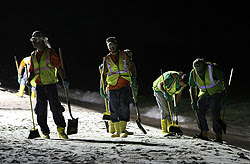Hey! An economic upside to this whole mess!
(sarcasm!) :(
PENSACOLA, Fla. - Kim Gamez, a grandmother of three and a cook laid off a year and a half ago, works the graveyard shift outdoors, shoveling tar balls off the once-pristine beaches of the Florida Panhandle.
"It's two birds with one stone," Gamez, 51, said during a break from cleaning a Perdido Key beach. "I'm doing something for the beach, and I'm able to support my grandkids." For a while, she sent out three resumes a day looking for a job that would match the $11.90 she used to make at Pensacola Regional Airport. Her new job pays $18 an hour.
The catastrophic Deepwater Horizon oil spill in the Gulf of Mexico has cost thousands of coastal residents their livelihoods. But it also has created hundreds of unexpected jobs for unemployed people to clean up shores marred by oily tar.
Trying to earn some goodwill after the worst oil spill in U.S. history, BP is hiring about 6,850 people - most of them unemployed - in Florida, Mississippi and Alabama to scour miles of white-sand beaches for tar that washes ashore in blobs, mats and patties.
As of Tuesday, nearly 1,500 jobless workers had been hired in Escambia County, Fla., where Pensacola Beach is, and in Okaloosa County, Fla., home to Destin and Fort Walton Beach, said Howard Miller, BP's community outreach liaison in Pensacola.
Machinery could clean up some of the tar, and some Panhandle officials have bashed BP for not deploying that equipment more quickly. But thick tar could clog mechanical rakes, and machines can't distinguish between oil-spill debris and eggs laid by turtles or shore birds.
Also, mechanical equipment would not create as many cleanup jobs, which have generated eager interest in the Panhandle, where the economy was finally picking up before the spill.
Since then, about 5,000 applications for cleanup jobs have flooded the Pensacola office of Workforce EscaRosa, the unemployment agency that serves Florida's two westernmost counties, said Kathy Karshna, assistant director of the agency's work-force development board. Escambia's unemployment rate in May was 10.3 percent; Santa Rosa's was 9.2 percent.
The work is grueling and physical. Cleanup workers take on 12-hour shifts, either in the oppressively hot days or the cooler nights, clad in long pants and sneakers or steel-toed boots covered in yellow plastic that workers call "chicken feet."
Some beachgoers have complained that workers spend too much time resting under blue tents along the beach and not enough time clearing the shoreline. BP contractors respond that they follow federal regulations on how long workers can be exposed to the sun.
During the day, the heat index regularly climbs above 100 degrees, sometimes forcing workers to "go black" and work for only, say, 15 minutes at a time before taking a longer break to avoid overheating. From sunset to sunrise, the temperature drops, but it also is more difficult to spot the oil blobs.
On a recent evening, Gamez and dozens of others worked under two sets of mobile lights brought in to illuminate a stretch of the beach, the lights carefully placed so as not to point toward the water and disturb sea turtles. Some workers also have small lamps attached to hats.
"At night, you see all the sand crabs," Gamez said. "You feel like you're on Discovery Channel."
Subscribe to:
Post Comments (Atom)


No comments:
Post a Comment